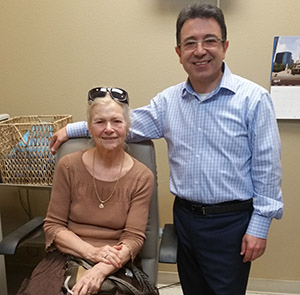
Your Questions, Dr. Abrams Answers
Dr. Jack Abrams and his staff get questions from patients about a wide range of ophthalmology conditions for topics including treatment options for Age-Related Macular Degeneration (AMD). We thought you might be interested in both the questions posed and the answers Dr. Abrams gives since many of you are also seeking the same information.
Today’s Q and A is, as noted above, about Age-Related Macular Degeneration (AMD). If you or someone you love suffers from AMD, Abrams Eye Institute can help. Fill out our form, or please call us at 702-304-9494.
Q. Is Age-Related Macular Degeneration hereditary?
A. There is a genetic component but not every patient has a family history of it.
Q. Will I go blind?
A. The central vision diminishes but the peripheral vision is not affected.
Q. Are there any treatments for AMD?
A. For dry type, we recommend using AREDS formula vitamins which are over the counter. For wet AMD, usually injections are used.
We can also offer a new technology called an IMT – intraocular miniature telescope – which can be inserted surgically.
Smaller than a pea, the IMT is a miniature telescope inserted in place of the natural lens of the eye. It magnifies images 2.7 times. It is a 6-month process to assimilate the telescope with brain. Thus vision improves gradually over time. However, at this point in development only a small percentage of people with AMD qualify for the IMT surgery. A prospective patient must first pass a battery of tests to ensure they are emotionally, physically and psychologically fit. Right now the IMT can only be placed in one eye. And it is only for patients with cataracts.
Dr. Abrams explains the IMT Surgery in this video:
For more information about Dr. Jack Abrams, the Abrams Eye Institute, or how we can help treat Age-Related Macular Degeneration (AMD) – or provide any other form of eye care you need, fill out the form on this page, or call us at 702-304-9494.

